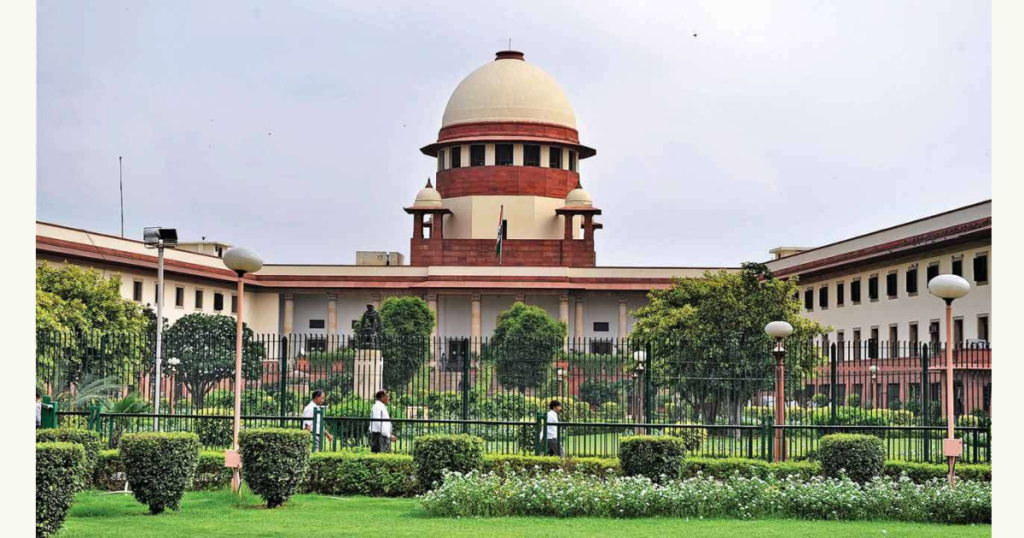Supreme Court orders mental health safeguards in schools, colleges, and coaching centres to combat rising student suicides. New rules target exam stress.
In a major move aimed at tackling the rising mental health crisis among students, the Supreme Court of India has issued a nationwide mandate requiring all educational institutions—including schools, colleges, coaching centres, training academies, and hostels—to implement robust mental health support systems. The Court described the growing number of student suicides as a “systemic failure” that demands urgent and comprehensive reforms. This judgment represents a pivotal moment in reshaping how India supports the emotional well-being of its students.
Invoking its constitutional powers under Article 32 and declaring its decision binding under Article 141, the Supreme Court took decisive action after hearing a tragic case involving a 17-year-old NEET aspirant, referred to as Ms X. She died by suicide in her hostel in Visakhapatnam on July 14, 2023, while preparing for the medical entrance test. The incident served as a heartbreaking catalyst for this far-reaching judgment.

A Turning Point for Student Mental Health
The Supreme Court’s ruling introduces a detailed framework to address the psychological distress affecting India’s student population.
Root Causes of the Crisis
The Court noted that the high rate of student suicides reflects a deeper dysfunction in the country’s educational culture.
- According to the National Crime Records Bureau (NCRB), there were 170,924 suicide cases in 2022. Of these, 13,044 were students, and over 2,200 were linked to exam failure.
- The figures reveal a widespread failure in recognizing and addressing students’ emotional needs.
- The Court also pointed out the absence of a consolidated legal framework to protect students’ mental health, necessitating judicial intervention.
Mandatory Institutional Reforms
Under the Court’s directive, every educational institution must now adopt inclusive mental health policies.
- These policies should align with existing government frameworks like the UMMEED draft guidelines, MANODARPAN initiative, and the National Suicide Prevention Strategy, and must be publicly shared and updated yearly.
- Institutions with more than 100 students must employ at least one qualified mental health expert—either a psychologist, counsellor, or social worker—while smaller setups must establish external referral arrangements.
- Mentorship systems are to be introduced, with each mentor assigned to a small group of students to provide close support, especially during exams or transitions.
- Suicide prevention helpline numbers, such as those under Tele-MANAS, must be displayed prominently in all student spaces.
Coaching Institutes Under the Spotlight
The Court paid special attention to private coaching institutes, recognizing their intense role in shaping academic stress.
- Segregation of students based on marks or performance must be stopped.
- Practices involving public shaming or humiliation are strictly banned.
- Unrealistic academic expectations should be avoided, with a focus on realistic, balanced goals.
Training, Reporting, and Inclusion Protocols
To create safer and more empathetic environments, the judgment mandates specific training and safeguarding measures.
- Teachers and staff—both academic and administrative—must receive biannual training on spotting early signs of mental distress, administering psychological first aid, and guiding students to appropriate support.
- Special attention must be paid to students from vulnerable backgrounds—SC, ST, OBC, EWS, LGBTQ+, differently-abled, or those dealing with grief and trauma.
- Institutions are required to set up confidential systems to report incidents like harassment, caste-based abuse, sexual assault, or discrimination—ensuring timely psychological support.
- Institutions may face legal consequences if they fail to respond adequately in situations leading to suicide or self-harm, with the Court warning of institutional liability.
Role of Families and Redefining Academic Success
The Court emphasized the importance of involving families and shifting societal narratives around achievement.
- Parents must be regularly engaged through awareness programs to help reduce the burden of expectations and create a nurturing home atmosphere.
- Mental health education and life skills must be embedded in orientation sessions and extracurricular programming.
- The definition of success should move beyond academic rankings and include broader personal and creative development.
- Both students and parents should receive structured career guidance to support interest-led career decisions, easing pressure to pursue only conventional paths.
Enhanced Safety in Student Residences and Coaching Cities
Residential safety was another key aspect of the ruling, especially for students living in high-pressure academic hubs.
- Hostels must install safety features like tamper-proof ceiling fans and secure rooftop access to help prevent impulsive self-harm.
- Major coaching centres in cities such as Kota, Jaipur, Chennai, Hyderabad, Sikar, Delhi, and Mumbai must significantly upgrade their mental health and counselling infrastructure.
Monitoring and Enforcement
The Supreme Court laid out a strict implementation roadmap.
- All States and Union Territories have two months to issue rules for regulating coaching centres, including mandatory registration and student protection norms.
- Each district must form monitoring committees led by the District Magistrate to enforce the guidelines, inspect facilities, and handle complaints.
- The central government has 90 days to file a status report explaining how the directives are being carried out, including cooperation with state authorities and the progress of a National Task Force report.
Case Background and Legal Follow-Up
The judgment was prompted by the case of Ms X, a 17-year-old NEET candidate who took her own life while staying at a hostel managed by Aakash Byju’s in Visakhapatnam.
- Following her father’s plea, the Supreme Court has transferred the investigation to the Central Bureau of Investigation (CBI) for an impartial probe.
- The Court has scheduled the next hearing for October 27, keeping the case under close watch as implementation progresses.
This landmark judgment reflects a much-needed shift towards prioritizing mental health in India’s education system, signalling a strong judicial commitment to safeguarding the lives and well-being of students nationwide.
Also Read: CBSE and CISCE Launch School Fitness Programmes, But Parents Say Behavioural Change Is Crucial
NEET-PG 2025 centre allotment sparks distress among doctors; IMA-JDN urges ministry to act